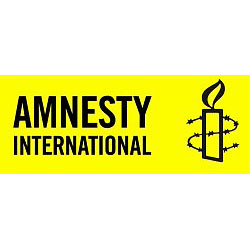Amnesty International’s position on the case of Syarhei Kavalenka
AMNESTY INTERNATIONAL
PUBLIC STATEMENT
18 May 2012
EUR 49/005/2012
Amnesty International’s position on the case of
Syarhei Kavalenka
Over the course of the last few days, a number of individuals and organizations, including the MEP Henryk Migalski, have called on Amnesty International to recognise Syarhei Kavalenka as a prisoner of conscience. This statement explains why Amnesty International has not been able to do so.
Syarhei Kavalenka, an activist of the Conservative Christian Party of the Belarusian People’s Front, was convicted in May 2010 on charges of resisting arrest in connection with an incident on 7 January 2010 when he had placed the previous Belarusian national flag on top of a 35 metre high New Year’s tree on Peramohi Square in Vitebsk. He was handed a suspended sentence of three years by the Oktyabrskij District Court of Vitebsk. On 24 February 2012, Syarhei Kavalenka was sentenced to two years and one month in prison under Article 415 of the Criminal Code for having violated the conditions of his suspended sentence.
The reason that Amnesty International has been unable to recognise Syarhei Kavalenka as a prisoner of conscience is that the organization is not in a position, in the absence of any witnesses, to establish with confidence that Syarhei Kavalenka did not violently resist arrest on 7 January 2010.
Amnesty International can, however, only call an individual a prisoner of conscience if the organization, is, after the most diligent investigation possible, confident that the individual has, indeed, been detained solely for having peacefully exercised the right to freedom of expression. This requires Amnesty International to be confident that charges brought are false, following as thorough an examination of the available evidence as possible; and not on the basis of a general presumption that the testimony of the state representatives used to secure the conviction was false.
In the case of Syarhei Kavalenka there are, certainly, grounds to believe that this may be the case. He had, prior to his arrest on 7 January 2010, been charged and sentenced to administrative detention and fines for expressing views and organizing political activities.
However if Amnesty International were to base its conclusions on who was a prisoner conscience solely on the presumption that the officials of a state of generally repressive regimes are always not stating the truth, it would undermine the credibility of the organization’s claims.
It is a corollary of having such a high threshold for recognising an individual as a prisoner of conscience that there will be sometimes those, such as Syarhei Kavalenka, who fall just below it.
It has been suggested to Amnesty International that our failure to call Syarhei Kavalenka a prisoner of conscience is to give the Belarusian authorities, and more specifically, the police officers involved the benefit of the doubt.
However, Amnesty International is definitely not saying that Syarhei Kavalenka is not a prisoner of conscience; only that Amnesty International cannot, in good faith, declare for certain that he is. If Amnesty International were to recognise as prisoners of conscience persons who were only likely to be prisoners of conscience, rather than those we are certain of, we would risk undermining the significance of the label to the detriment of those who we do recognize.
In April 2012, Amnesty International raised concerns about the Syarhei Kavalenka’s health condition and wrote to the Minister of Internal Affairs of the Republic of Belarus, reminding him of Belarus's international human rights obligations under Article 10 (1) of the International Covenant on Civil and Political Rights to treat all persons deprived of their liberty with humanity and with respect, and called for Syarhei Kavalenka to receive an independent and impartial medical examination and to be transferred to a civilian hospital for treatment.
Syarhei Kavalenka had been on hunger strike from the moment of his arrest on 19 December 2011. The hunger strike was interrupted by force feeding him through a tube on 16 January 2012. After the force feeding, he started eating once a day for a very short period of time and then renewed his hunger strike. Syarhei Kavalenka had been on unceasing hunger strike since 19 February; his condition at the time was life threatening and required special medical care. Due to his health condition, Syarhei Kavalenka was transferred to the psychiatric ward at Vitba - 3 penal colony hospital. As of 17 March Syarhei Kavalenka was forcibly injected with glucose, amino acids and saline solution. As of 31 March he was forcibly fed through a tube with baby food, and porridge that had been gradually introduced in his diet. On 11 April, he started eating again. However on 8 May he resumed his hunger strike and he is currently being held in detention centre number two in Vitebsk. Syarhei Kavalenka’s condition is critical, and he requires specialist medical care.
Elena Kavalenka, the wife of Syarhei Kavalenka, Syarhei's cousin and an activist of the European Belarus civil campaign were detained in the early morning on 18 May before the appeal hearing for Syarhei Kavalenka. They were released on the same day after being charged with minor hooliganism under the Article 17.1 of the Code of Administrative Offences of the Republic of Belarus following their attempt to write 'Freedom to Syarhei Kavalenka’ on the pavement with chalk. Their court hearing is scheduled to take place on 30 May. Amnesty International considers this action to constitute a legitimate exercise of the freedom of expression and calls on Belarusian authorities to drop the charges against them and refrain from further harassment of Syarhei Kavalenka’s family and his supporters.
Amnesty International will continue to work on Syarhei Kavalenka’s case and respond as necessary to developments.


















